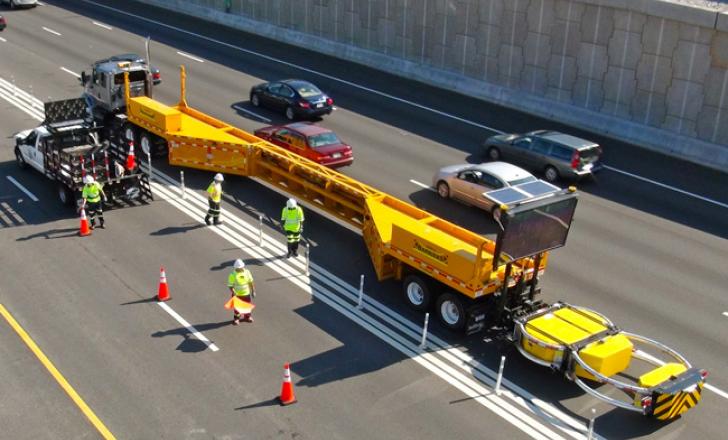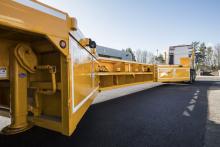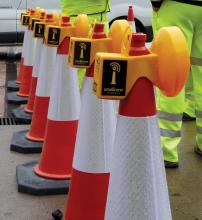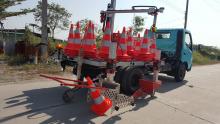Two giant US-made 21m-long mobile barriers are now keeping highway maintenance workers safe in England.
The 16tonne barriers were made in by Mobile Barriers, based in Denver, in the state of Colorado. They have been deployed in the West Midlands region of England in collaboration with UK highways maintenance contractor Kier.
With yearly operating costs of US$17,000, the MBT-1 can pay for itself with nominal usage, according to the manufacturer. This could be in less than two years with 10-15 lane clos
July 16, 2019
Read time: 3 mins

The MBT-1 can protect areas to either the right or the left side of the road, depending on to which end of the barrier that the semi-tractor is attached
Two giant US-made 21m-long mobile barriers are now keeping highway maintenance workers safe in England.
The 16tonne barriers were made in by 6724 Mobile Barriers, based in Denver, in the state of Colorado. They have been deployed in the West Midlands region of England in collaboration with UK highways maintenance contractor Kier.
With yearly operating costs of US$17,000, the MBT-1 can pay for itself with nominal usage, according to the manufacturer. This could be in less than two years with 10-15 lane closures per month.
The barriers are around 2.5m wide and 3.7m high. Ground clearance is just over 0.3m. Top speed for the combined barrier with its traction unit, two axels and four wheels is around 90kph.
8100 Highways England, the client, said that the barriers replace dozens of temporary maintenance cones along the highway. Apart from being more physically superior to cones, it means workers are not at risk putting our and retrieving the cones before and after completion of maintenance work. It also reduces the time to complete work on a specified section for highway.
The barriers absorb the side impact of a vehicle while a truck-mounted crash cushion at the rear gives further protection.
6724 Mobile Barriers says the unit can be fitted with integrated power, message board, safety lighting, work lighting, a truck-mounted attenuator and other safety features. Surface decks and lockable storage areas can be used to carry tools, equipment, materials and supplies to and from the jobsite.
The MBT-1 can protect areas to either the right or the left side of the road depending on which end of the MBT-1 that the semi-tractor is attached. MBT-1’s design enables easy visual inspection, repair, and modular replacement in the case of an incident.
According to Mobile Barriers, the MBT-1 was conceived following a tragic incident in which two Colorado maintenance workers were killed by a wrong-way driver in June 2004. It underwent four years of development and refinement with the 5406 Colorado Department of Transportation and the Federal Highway Administration before its first deployment, in Colorado in June 2008. After further in service testing and evaluation, it was formally introduced in San Jose the following year where it received the 2466 American Traffic Safety Services Association’s Innovation of the Year Award for 2009.
Highways England also recently announced that self-driving trucks which could help speed up roadworks are being tested for the first time in England.
The dump trucks provide the potential to work around the clock, according to Highways England, so could help reduce the length of time of roadworks. By being autonomous they also reduce the risk of road workers being involved in incidents on site.
Highways England has committed around US$190,000 from its innovation designated fund into the dump truck trial on the A14 between Cambridge and Huntingdon, near London.











